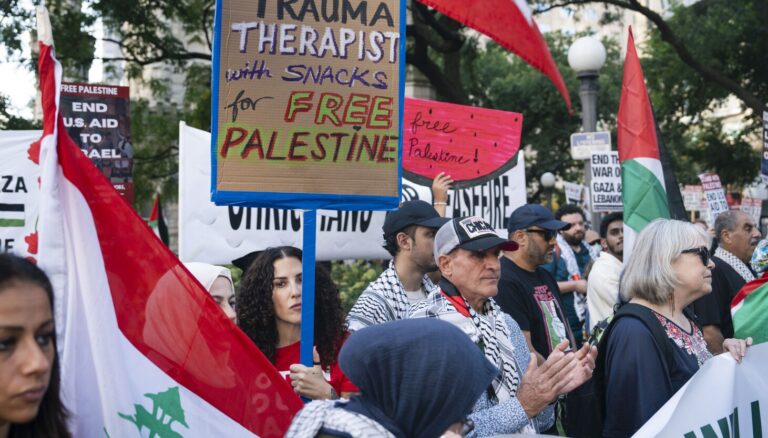Dr. Hayat Nader, a licensed Syrian psychiatrist based in Uptown, warns her patients: “Don't go to the hardware store to buy milk.”
It is her response to the shift in the way patients sought care in the wake of the war in Gaza. She said the people who come to her — from marginalized communities in Chicago and those who support Palestinians living in the area — are looking for someone who understands from personal experience what they have been through.
This way, she added, “they don't have to explain their entire experience, and they don't encounter resistance about what reality is for them.”
As the war continues with no end in sight, Chicago mental health care providers now face questions about how best to treat patients affected by the violence. Some in the field argue that neutrality about conflict is harmful to patients and say providers' experiences have a place in treatment. Others feel that giving up an empathetic but neutral approach to care conflicts with the way they should do their jobs.
“People want to know that you are a safe place,” said Anna Finkelstein, a licensed Jewish clinical social worker in Skokie. “Being a therapist means being inclusive and helping marginalized populations.”
But with the new way of thinking, it's as if you have to choose sides. “It goes against everything we've been taught.”
Finkelstein is trained to perform therapeutic neutrality, a concept that forces her to remove herself from the session to best help the client. If the views are too deep, the provider can offer a referral to someone else. But in recent months she has felt pressure to reveal her views on the war.
I have also seen a professional impact from this transformation. In March, her name appeared on a list of “Zionist healers” posted on a local Facebook group; The circular said health care providers should not refer patients to the people on the list. She said she never expressed her views on Israel publicly to avoid interference in its practices. She believes she was chosen because of her “Jewish-sounding name.” Eventually, she found that she gained other clients who saw her listed.
“Regardless of whether our views differ from the client or not, it should be about meeting their needs and being curious or empathetic about their perspective,” said Shayna Campbell, a Jewish licensed professional clinical counselor who works with Finkelstein.
As mainstream care moves away from psychoanalytic models, in which neutrality is the norm, more providers are able to use “self-disclosure,” said Dr. Vile Wright, a licensed practitioner and senior director of health care innovation at the American Psychological Association. “.
For any practitioners who find it difficult to find balance, Wright suggested consulting peers for advice, but said providers need to consider the best way to treat a patient on a case-by-case basis.
“There's a lot going on in the world right now, so acknowledging that and saying 'I feel that too' can be helpful,” said Wright, a Villa Park resident. “The hard part is making sure the therapist isn't talking about themselves.”
Some recent studies have also criticized training that ignores the effects of global conflicts.
“Healthcare professionals must be trained in structural competence to challenge the apolitical effects of medical neutrality, with the goal of promoting peace, health equity, and social justice,” researchers Zvika Orr and Mark Fleming wrote in a 2022 study published in the journal Global Public Health. .
Staying neutral can shift the blame for mental health struggles caused by structural biases to patients, Nader said.
“If I don’t acknowledge the systems in place that trigger these feelings, I’m just saying the client is sick,” she said.
Privilege can influence providers to see the issues facing patients as “politics,” which they must To be aware of it. neutral.
“It's not often that I have people of color, or people who are not straight, or people who are not neurotypical talking about their lives and calling it 'politics,'” Greenspan said.
But Finkelstein and Campbell said the pressure to reveal their views pushed them and other Jews to retreat to their local communities.
“I never felt targeted or marginalized as a Jew until this year,” Finkelstein said.
